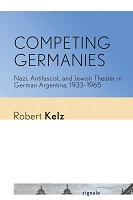Competing Germanies
Nazi, Antifascist, and Jewish Theater in German Argentina, 1933–1965
| dc.contributor.author | Kelz, Robert | |
| dc.date.accessioned | 2024-03-27T10:47:09Z | |
| dc.date.available | 2024-03-27T10:47:09Z | |
| dc.date.issued | 2020 | |
| dc.identifier | OCN: 1143802830 | |
| dc.identifier.uri | https://library.oapen.org/handle/20.500.12657/88751 | |
| dc.description.abstract | Following World War II, German antifascists and nationalists in Buenos Aires believed theater was crucial to their highly politicized efforts at community-building, and each population devoted considerable resources to competing against its rival onstage. Competing Germanies tracks the paths of several stage actors from European theaters to Buenos Aires and explores how two of Argentina's most influential immigrant groups, German nationalists and antifascists (Jewish and non-Jewish), clashed on the city's stages. Covered widely in German- and Spanish-language media, theatrical performances articulated strident Nazi, antifascist, and Zionist platforms. Meanwhile, as their thespian representatives grappled onstage for political leverage among emigrants and Argentines, behind the curtain, conflicts simmered within partisan institutions and among theatergoers. Publicly they projected unity, but offstage nationalist, antifascist, and Zionist populations were rife with infighting on issues of political allegiance, cultural identity and, especially, integration with their Argentine hosts. Competing Germanies reveals interchange and even mimicry between antifascist and nationalist German cultural institutions. Furthermore, performances at both theaters also fit into contemporary invocations of diasporas, including taboos and postponements of return to the native country, connections among multiple communities, and forms of longing, memory, and (dis)identification. Sharply divergent at first glance, their shared condition as cultural institutions of emigrant populations caused the antifascist Free German Stage and the nationalist German Theater to adopt parallel tactics in community-building, intercultural relationships, and dramatic performance. Its cross-cultural, polyglot blend of German, Jewish, and Latin American studies gives Competing Germanies a wide, interdisciplinary academic appeal and offers a novel intervention in Exile studies through the lens of theater, in which both victims of Nazism and its adherents remain in focus. | en_US |
| dc.language | English | en_US |
| dc.relation.ispartofseries | Signale: Modern German Letters, Cultures, and Thought | en_US |
| dc.subject.classification | thema EDItEUR::D Biography, Literature and Literary studies::DS Literature: history and criticism | en_US |
| dc.subject.classification | thema EDItEUR::A The Arts::AT Performing arts::ATD Theatre studies | en_US |
| dc.subject.classification | thema EDItEUR::D Biography, Literature and Literary studies::DS Literature: history and criticism::DSG Literary studies: plays and playwrights | en_US |
| dc.subject.other | migration studies, Buenos Aires, Gelmanistic, theater history, Free German Stage, Zionist culture, integration, Argentina, Germany, Theater, Jewish | en_US |
| dc.title | Competing Germanies | en_US |
| dc.title.alternative | Nazi, Antifascist, and Jewish Theater in German Argentina, 1933–1965 | en_US |
| dc.type | book | |
| oapen.relation.isPublishedBy | 06a447d4-1d09-460f-8b1d-3b4b09d64407 | en_US |
| oapen.relation.isbn | 9781501739866 | en_US |
| oapen.relation.isbn | 9781501739859 | en_US |
| oapen.relation.isbn | 9781501739880 | en_US |
| oapen.pages | 370 | en_US |

